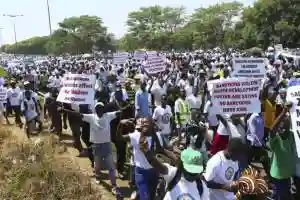The British Embassy in Harare has said only five (5) Zimbabweans and one (1) entity are left under sanctions adding that the restrictive measures are not to blame for the collapse of the economy of the southern African country. In a statement seen by Pindula News, the Embassy said the sanctions do not hurt the common man. Read the statement issued as Zimbabwe is commemorating Anti-sanctions day:
To be absolutely clear, the UK has targeted sanctions on five Zimbabwean officials and one entity for human rights violations and serious corruption. The five individuals are Owen Ncube, Isaac Moyo, Godwin Matanga, Anselem Sanyatwe and Kudakwashe Tagwirei. The entity is the Zimbabwe Defence Industries. These measures do not affect trade or economic development.
Trade between UK and Zimbabwe was 175 million USD last year. We are working hard to increase this.
The UK also provides considerable development assistance to education and health care in Zimbabwe — 114 million USD this year. This is assistance in support of Zimbabwe’s own National Development Strategy.
We want to see Zimbabwe succeed. Anything to suggest that the UK wants to harm Zimbabwe or ordinary Zimbabweans is simply false.
The 5 individuals, four of whom are also on the U.S. list, and the Zimbabwe Defence Industries, also on the U.S. list, are currently subject to UK financial sanctions.
Originally imposed at the turn of the millennium over the “gross violation of human rights” during the fast-track land reform programme, the restrictive measures were renewed annually.
Some, including Kuda Tagwirei, were recently added for alleged corruption, aiding the government and proximity to political elites.
For its part, the Zimbabwean government argues that sanctions have cost billions of dollars. Zimbabwe’s permanent secretary for information Nick Mangwana said in 2029 in reference to all sanctions on Zimbabwe:
You can’t say sanctions are targeted when you specify 56 of the biggest companies in Zimbabwe. What is left?
When Mr Mugabe was forced from office in 2017, two UN human rights experts supported calls for the lifting of sanctions.
They said the measures could not be said to be “limited” or “targeted”, as the people and companies affected represented the vast majority of the economy.

